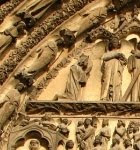
Tired of stepping over all the cracks in the sidewalks of Paris, artist Juliana Santacruz Herrera decided to take action. To make her repairs she chose not concrete and asphalt, but a much softer material: yarn. Weaving together brightly colored pieces that fit each of the broken places like their own cozy sweaters, she set to work, embedding the fabric in the cracks and holes. Instantly have become magically transformed.
Whimsy is a gift, and it's relevant and welcome under all kinds of circumstances, including trying and difficult ones. By exaggerating the ubiquitous cracks, Santacruz Herrara actually transforms them into something friendly and delightful. She points to the problem, but without blame or judgment. Her work and that of other street artists bring beauty to the city in an unexpected way.
To see more great street art, visit StreetArtUtopia.com.






